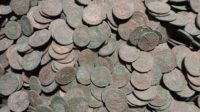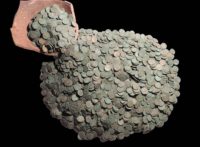 Metal detector enthusiasts discovered a hoard of Roman copper coins near the village of Rauceby in Lincolnshire in July of 2017. They had searched the area for years with only a few minor finds to show for it. This time when their detectors signaled the presence of metal, when they dug they found a massive quantity of Roman coins.
Metal detector enthusiasts discovered a hoard of Roman copper coins near the village of Rauceby in Lincolnshire in July of 2017. They had searched the area for years with only a few minor finds to show for it. This time when their detectors signaled the presence of metal, when they dug they found a massive quantity of Roman coins.
They alerted the authorities and a full excavation of the site ensued. Lincolnshire County Council archaeologist Adam Daubney and Sam Bromage from the University of Sheffield unearthed the ceramic pot that the coin hoard was buried in and small separate hoard of 10 coins. All told, more than 3000 copper-alloy were found. It is the largest coin hoard from the 4th century ever found in Britain.
Dr Daubney commented: “The coins were found in a ceramic pot, which was buried in the centre of a large oval pit – lined with quarried limestone. What we found during the excavation suggests to me that the hoard was not put in the ground in secret, but rather was perhaps a ceremonial or votive offering. The Rauceby hoard is giving us further evidence for so-called ‘ritual’ hoarding in Roman Britain.”
Dr Eleanor Ghey, Curator of Iron Age and Roman Coin Hoards at the British Museum, commented: “At the time of the burial of the hoard around AD 307, the Roman Empire was increasingly decentralised and Britain was once again in the spotlight following the death of the emperor Constantius in York. Roman coins had begun to be minted in London for the first time. As the largest fully recorded find of this date from Britain, it has great importance for the study of this coinage and the archaeology of Lincolnshire.”
 The coins were officially declared treasure under the terms of the 1996 Treasure Act by the Lincoln Coroner’s Court on May 9th. The hoard is in the British Museum right now for assessment by the valuation committee. Once fair market value is assessed, local museums will be given first crack at acquiring the hoard by paying the assessed value in compensation to be split 50/50 by the finders and landowner. In this case the value will likely be in the tens of thousands of pounds.
The coins were officially declared treasure under the terms of the 1996 Treasure Act by the Lincoln Coroner’s Court on May 9th. The hoard is in the British Museum right now for assessment by the valuation committee. Once fair market value is assessed, local museums will be given first crack at acquiring the hoard by paying the assessed value in compensation to be split 50/50 by the finders and landowner. In this case the value will likely be in the tens of thousands of pounds.
I appreciate you putting in what happens to the treasure found.
I appreciate you putting in what happens to the treasure found.
I just tried to post this and got what’s my usual reply for this blog-
>>This page isn’t working http://www.thehistoryblog.com is currently unable to handle this request.
HTTP ERROR 500<<
I'll hit the "Add comment" button again and go about my day…
It looks like both your original comment and your second attempt came through as normal, Rob. I’ll poke around to see what might have caused the glitch. :thanks:
Mine usually comes up with the same error message. At this point I know that it shows up even with the error message, glad it is not just me.
At first I thought I was rereading the post on another big cache of coins but realize this is two in short order. Makes me want to buy a metal detector. But I have a feeling ther isn’t much buried in my South Carolina soil.
Very cool, thanks for sharing. There’s a quite funny BBC series “Detectorists” that’s about two guys who are metal detector enthusiasts, it was highly entertaining.